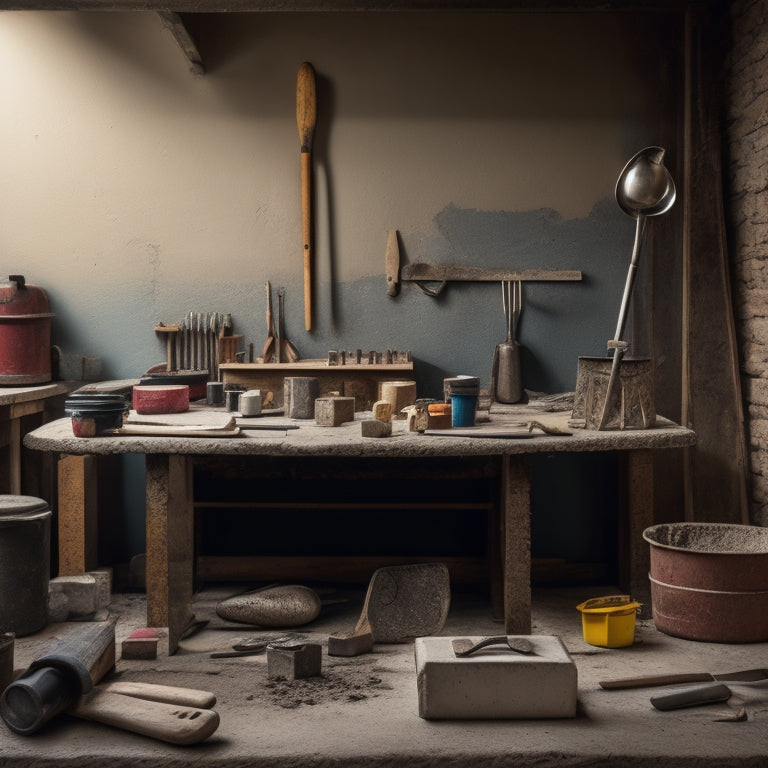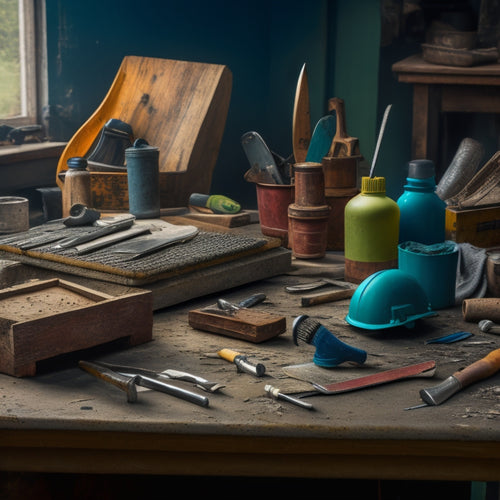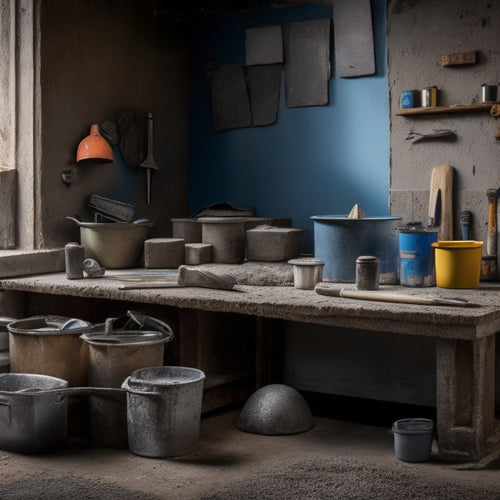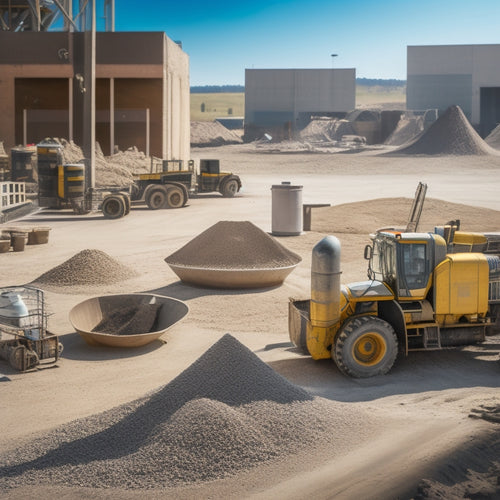
Top-Rated Hand Tools for Concrete Block Construction
Share
When you're tackling a concrete block construction project, having the right hand tools is vital for precision, efficiency, and structural integrity. You'll need essential trowels like pointing, finishing, and notched trowels for applying and shaping mortar. Block laying and finishing tools, such as jointers, levels, and straightedges, guarantee accurate block placement and clean finishes. Measuring and leveling essentials like high-quality levels, laser levels, and tape measures assure accurate measurements. Cutting and breaking tools, safety gear, and other vital hand tools round out your must-have list. By investing in these top-rated hand tools, you'll be well on your way to a successful project - and there's more to discover about each of these essential tools.
Key Takeaways
• Essential trowels for cinder block construction include pointing, finishing, and notched trowels, which require regular maintenance and proper storage.
• Block laying and finishing tools, such as jointers, levels, and straightedges, ensure accurate and plumb block placement and a clean finish.
• Measuring and leveling essentials, including high-quality levels, laser levels, tape measures, and squares, guarantee accurate measurements and proper alignment.
• Cutting and breaking tools, like block chisels, masonry saws, and diamond-coated blades, are necessary for precise cuts and clean edges.
• Safety gear, including protective gloves, respiratory masks, and durable materials, is crucial for protecting hands and lungs during concrete handling.
Essential Trowels for Cinder Blocks
You'll need a range of trowels to effectively lay and finish cinder blocks, including a pointing trowel, a finishing trowel, and a notched trowel, each designed for a specific stage of the construction process.
The pointing trowel, with its small, pointed blade, is ideal for applying and shaping mortar in tight spaces. The finishing trowel, with its flat, wide blade, is used to smooth and finish the surface of the block. The notched trowel, with its notched blade, is used to apply an even layer of mortar to the block.
It's essential to maintain your trowels properly to guarantee they continue to perform at their best. Clean your trowels regularly to prevent mortar from drying on the blade.
Store them in a dry place, away from direct sunlight, to prevent rust or corrosion. You should also lubricate the hinge of your trowel periodically to keep it moving smoothly.
Block Laying and Finishing Tools
To master block laying techniques, you'll need jointers, which help align blocks and remove excess mortar.
You'll also require a level, a straightedge, and a string line to guarantee accurate and plumb block placement.
For finishing techniques, a pointing trowel or a joint finishing tool is necessary for filling and finishing joints.
A block hammer or a rubber mallet is also essential for tapping blocks into place and removing excess mortar.
Additionally, a utility knife or a block chisel can be used to trim or remove excess material.
Don't forget a mixing stick or a paddle for mixing and applying mortar.
By having these tools in your arsenal, you'll be able to efficiently and effectively lay and finish concrete blocks, resulting in a high-quality finish that will last for years to come.
With the right tools and techniques, you'll be able to tackle any concrete block construction project with confidence.
Measuring and Leveling Essentials
As you begin a concrete block construction project, you'll need to guarantee accuracy and precision in your measuring and leveling techniques.
Five essential measuring and leveling tools are required to confirm accurate concrete block construction, including a high-quality level, a laser level, a tape measure, a square, and a spirit level. These tools will help you achieve leveling accuracy, which is critical in concrete block construction.
A high-quality level and spirit level will allow you to check for plumb and level surfaces, making sure that your blocks are laid correctly.
A laser level will project a level line or plane, enabling you to check the accuracy of your measurements.
A tape measure will come in handy for measuring distances, widths, and heights, while a square will help you guarantee that your blocks are properly aligned.
Cutting and Breaking Tools Required
Concrete block construction requires precise cutting and breaking of blocks to fit around obstructions, fill gaps, and achieve desired wall shapes. This makes it essential to have the right cutting and breaking tools on hand.
You'll need a set of block chisels in various widths to remove excess material and create clean edges. These chisels are designed for heavy-duty use and can withstand the rigors of breaking concrete blocks.
For more precise cuts, a masonry saw is a must-have. These saws are specifically designed to cut through concrete blocks, bricks, and pavers with ease. They're available in various blade sizes and types, including diamond-coated blades for extra durability.
When choosing a masonry saw, consider the type of blocks you'll be working with and the frequency of use. Additionally, don't forget to have a supply of replacement blades on hand to guarantee continuous workflow.
With the right cutting and breaking tools, you'll be able to tackle any concrete block construction project with confidence and precision.
Safety Gear for Concrete Handling
When you're working with concrete, you're exposed to harsh materials that can cause serious harm.
You'll need to wear protective gear to prevent injuries and illnesses, and that starts with your hands and lungs.
You should always put on gloves that resist abrasion and punctures, and a respiratory mask that filters out dust and other hazardous particles.
Protective Gloves Matter
You'll need a reliable pair of protective gloves to safeguard your hands from the abrasive nature of concrete blocks and the harsh chemicals used in their construction.
When choosing the right gloves, pay attention to the glove materials. Look for gloves made from durable, puncture-resistant materials like synthetic leather or heavy-duty nylon. These materials will provide a strong barrier against cuts and abrasions.
Additionally, consider gloves with advanced grip technology. This feature will help you maintain a secure grasp on wet or slippery concrete blocks, reducing the risk of accidents and injuries. Some gloves also feature grip patterns on the palm and fingers, which enhance dexterity and control.
Don't compromise on comfort either – opt for gloves with breathable materials and ergonomic design to reduce fatigue and discomfort during extended wear.
Respiratory Mask Essentials
Handling cement and concrete products can expose you to airborne silica dust, crystalline silica, and other hazardous particles that can cause serious respiratory issues. That's why wearing a high-quality respiratory mask is crucial when working with concrete.
You need a mask that provides effective dust filtration, capturing at least 99.97% of particles as small as 0.3 microns. Look for a mask with a HEPA (High Efficiency Particulate Air) filter, which is designed to capture even the smallest particles.
When choosing a respiratory mask, consider mask comfort, as you'll likely be wearing it for extended periods. Opt for a mask with adjustable straps, a soft nose bridge, and a breathable design to minimize heat buildup.
You should also verify the mask fits snugly around your face, with no gaps or leaks. A comfortable mask is more likely to be worn correctly, providing you with the protection you need to focus on the job at hand.
Other Crucial Hand Tools Needed
Five essential hand tools round out your concrete block construction kit: a pointing trowel, a jointer, a level, a masonry line stretcher, and a spirit level.
These tools will help you achieve professional-looking results and guarantee structural integrity.
The pointing trowel is perfect for applying block adhesive techniques, such as the 'buttering' method, which involves spreading a thin layer of adhesive on the block's surface.
The jointer, on the other hand, is used to finish and clean masonry joint types, like the concave and V-joint.
A level guarantees your blocks are aligned perfectly, both horizontally and vertically.
The masonry line stretcher helps you create straight lines and maintain even spacing between blocks.
Finally, the spirit level is a must-have for checking the block's alignment and plumbness.
These hand tools will become your go-to companions on the construction site.
Frequently Asked Questions
Can I Use Hand Tools for Constructing Large Concrete Block Buildings?
When building large concrete block structures, you're likely wondering if hand tools are up to the task.
While they can be effective, you'll need to take into account hand tool efficiency and construction safety.
For instance, using a manual block splitter can be time-consuming and may lead to fatigue, increasing the risk of accidents.
It's essential to weigh the benefits of hand tools against the demands of your project, ensuring you're prioritizing both efficiency and safety on the job site.
Are Concrete Block Construction Hand Tools Suitable for DIY Projects?
You thought you'd need a crane and a crew to tackle a concrete block project, but surprise! Hand tools can be your best friend for DIY endeavors.
When it comes to DIY tool selection, you'll want to focus on essentials like trowels, jointers, and levels.
Mastering concrete block techniques like laying, leveling, and finishing will make your project shine.
With the right hand tools and techniques, you'll be building like a pro in no time, serving others with your newfound skills.
How Often Should I Clean and Maintain My Hand Tools?
To guarantee your hand tools remain in top condition, you should establish a regular cleaning and maintenance routine.
Follow tool maintenance tips to remove dirt and debris after each use, and set a schedule based on cleaning frequency guidelines.
Daily, wipe down tools with a dry cloth;
weekly, inspect for rust and corrosion;
and monthly, apply a rust inhibitor.
Can I Rent or Borrow Hand Tools for Concrete Block Construction?
When tackling a concrete block construction project, you might wonder if renting or borrowing hand tools is a viable option.
You can explore tool rental options, but be aware that availability and quality may vary.
If borrowing from a friend or colleague, establish clear borrowing guidelines, including return dates and responsibility for maintenance or damages.
Are There Any Hand Tool Brands Specifically Designed for Concrete Work?
Imagine you're a master sculptor, shaping a masterpiece from raw concrete. You need the right chisels to bring your vision to life.
Similarly, in concrete construction, you require specialized hand tools to get the job done efficiently.
Look for concrete tool brands like Marshalltown, Bon Tool, and Kraft Tool, which offer high-quality, specialized tools designed specifically for concrete work.
These brands understand the unique demands of concrete construction and provide the right tools to help you build with precision and confidence.
Conclusion
You've got the blueprint for a solid concrete block construction project, and now it's time to put the puzzle pieces together.
With these top-rated hand tools, you'll be building like a master mason in no time.
Remember, a strong foundation requires the right instruments, and this arsenal will help you lay the groundwork for a sturdy structure that will stand the test of time - a concrete castle that will be the envy of the neighborhood.
Related Posts
-

Must-Have Handheld Tools for Concrete Repair
When tackling a concrete repair project, it is crucial to have the right handheld tools to achieve a professional fin...
-

Top Tools for Beginners in Concrete Masonry Coating
You're about to begin a concrete masonry coating project, and having the right tools is essential. Start with essenti...
-

Why These Concrete Tools Are Always in Demand
You rely on a set of trusted concrete tools to deliver high-quality results, and it's not surprising - these tools ar...


